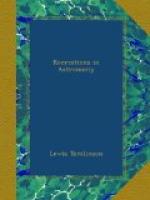What if there are some sounds that do not seem to be musically rhythmic. I have seen where an avalanche broke from the mountain side and buried a hapless city; have seen the face of a cliff shattered to fragments by the weight of its superincumbent mass, or pierced by the fingers of the frost and torn away. All these thunder down the valley and are pulverized to sand. Is this music? No, but it is a tuning of instruments. The rootlets seize the sand and turn it to soil, to woody fibre, leafy verdure, blooming flowers, and delicious fruit. This asks life to come, partake, and be made strong. The grass gives itself to all flesh, the insect grows to feed the bird, the bird to nourish the animal, the animal to develop the man.
Notwithstanding the tendency of all high-class energy to deteriorate, to find equilibrium, and so be strengthless and dead, there is, somehow, in nature a tremendous push upward. Ask any philosopher, and he will tell you that the tendency of all endowed forces is to find their equilibrium and be at rest—that is, dead. He draws a dismal picture of the time when the sun shall be burned out, and the world float like a charnel ship through the dark, cold voids of space—the sun a burned-out char, a dead cinder, and the world one dismal silence, cold beyond measure, and dead beyond consciousness. The philosopher has wailed a dirge without [Page 261] hope, a requiem without grandeur, over the world’s future. But nature herself, to all ears attuned, sings paeans, and shouts to men that the highest energy, that of life, does not deteriorate.
Mere nature may deteriorate. The endowments of force must spend themselves. Wound-up watches and worlds must run down. But nature sustained by unexpendable forces must abide. Nature filled with unexpendable forces continues in form. Nature impelled by a magnificent push of life must ever rise.
Study her history in the past. Sulphurous realms of deadly gases become solid worlds; surplus sunlight becomes coal, which is reserved power; surplus carbon becomes diamonds; sediments settle until the heavens are azure, the air pure, the water translucent. If that is the progress of the past, why should it deteriorate in the future?
There is a system of laws in the universe in which the higher have mastery over the lower. Lower powers are constitutionally arranged to be overcome; higher powers are constitutionally arranged for mastery. At one time the water lies in even layers near the ocean’s bed, in obedience to the law or power of gravitation. At another time it is heaved into mountain billows by the shoulders of the wind. Again it flies aloft in the rising mists of the morning, transfigured by a thousand rain bows by the higher powers of the sun. Again it develops the enormous force of steam by the power of heat. Again it divides into two light flying airs by electricity. Again it stands upright as a heap by the power of some law in the spirit realm, whose mode of working we are not yet large enough [Page 262] to comprehend. The water is solid, liquid, gaseous on earth, and in air according to the grade of power operating upon it.




